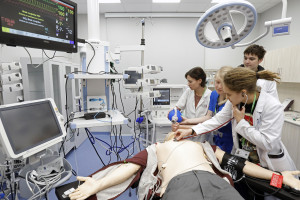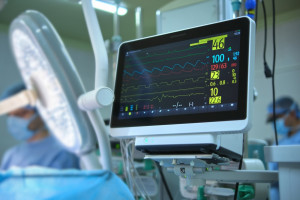Hospitals are waiting for groundbreaking artificial intelligence tools. The tender is scheduled to begin in a few weeks.

- Public procurement for the Smart Services Platform will soon begin – mandatory for implementation by hospitals carrying out investments under the National Reconstruction Plan.
- The platform will enable support for radiologists, among others, through artificial intelligence tools, which will speed up diagnosis and facilitate the detection of urgent cases.
- IT service providers expect to receive all technical details of the new solution before the results of the competition for KPO funds are announced.
- Uncertainty and short investment implementation time have already affected the pricing of IT services for hospitals
The public procurement process for the creation of the Smart Services Platform is expected to begin in a few weeks, the e-Health Center informs us. This is important both for hospitals that have applied for funding from the National Recovery Plan (as implementation of the Smart Services Platform is mandatory) and for IT service providers who will connect their facilities to the Platform.
What will the Smart Services Platform be? In short, it's a technical infrastructure managed by the e-Health Center, serving as an "intermediary" for medical facilities, enabling the use of modern tools.
The first to be launched will be solutions for radiologists , facilitating the annotation of imaging studies with the support of artificial intelligence . This tool will enable specialists to analyze diagnostic images faster and more precisely, detect subtle pathological changes, and more efficiently prioritize cases requiring urgent intervention, such as strokes.
CeZ has already completed the initial consultation phase, which included participation from market representatives who may be interested in collaborating. The e-Health Center staff emphasize that the PUI is a pioneering project – a similar project on this scale has never been implemented in Poland. An additional challenge is the use of artificial intelligence, which is constantly evolving.
At the end of April this year, CeZ released the PUI integration documentation so that IT companies could familiarize themselves with the planned solution. However, we're hearing from IT vendors that the documentation is rather general and could benefit from further detail. CeZ claims, however, that it's supplementing the knowledge of interested parties through webinars and face-to-face meetings with representatives of chambers of commerce, among other initiatives.
The lack of full, final documentation will put suppliers in a difficult situationBusinesses' uncertainty regarding the resources needed to implement PUI, we've learned, has already been reflected in the pricing offered to hospitals. Marzena Kowalczyk , acting director of the University Clinical Center of the Medical University of Warsaw, told Rynek Zdrowia that after the KPO competition was announced, IT companies estimated service fees that were several times higher, particularly for mandatory tasks.
Rafał Dunal , president of the Polish Chamber of Medical IT, representing the majority of IT solution providers for the healthcare sector, emphasizes that the timely release of the final versions of integration interfaces with the Intelligent Services Platform, as well as specifications of new EDM documents and other components necessary for the implementation of projects by hospitals under the D1.1.2 investment from the KPO is of key importance.
According to the President of PIIM, this documentation should be published no later than the time of concluding agreements between the Ministry of Health and the hospitals that will receive financing (behind the scenes, there is talk of mid-September 2025 ).
- Currently, only some of the materials have been made publicly available - for example, in the case of the Smart Services Platform, version 1.0 is available, which is expected to undergo further changes - says Rafał Dunal.
The President of PIIM adds that the lack of a full, final version of the documentation at the stage of preparing tender procedures by hospitals will once again put suppliers in a difficult situation - they will be forced to estimate integration works and system expansion without clearly defined technical requirements from CeZ.
Rafał Dunal adds that the IT system supplier community also expects the launch of fully functional test environments, enabling actual verification of integration with planned systems.
Write to the author: [email protected]
Copyrighted material - reprint rules are specified in the regulations .
rynekzdrowia











